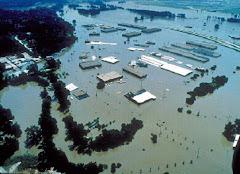Can We Prevent Climate Change?
Recall the tale of the Viking King Canute who had his throne carried to the beach whereupon he commanded the tide to halt so as not to wet his feet and robes. Naturally the tide ignored the King and according to Henry of Huntingdon, a 12th-century chronicler, Canute leapt backwards and said, "Let all men know how empty and worthless is the power of kings, for there is none worthy of the name, but He whom heaven, earth, and sea obey by eternal laws." The king then He then hung his gold crown on a crucifix, and never wore it again.
Even if this story has a touch of fantasy about it, the idea that nature is not ours to control has a real bearing on the challenge of climate change.
We probably need to accept that natural climate change is real, has been around ever since there was an atmosphere stable enough to create a climate and has causes that are definitely beyond us.
We will not be able to stop the earth from wobbling in its orbit, alter the sequence of sunspot activity and the subsequent energy pulses from the sun, or moderate volcanic eruptions and their gaseous emissions.
We are stuck with what these mechanisms bring. In one sense we are passengers on the roller coaster of global climate change and even to pretend we can be preventing climate change is just a little crazy.
But Google 'preventing climate change' and you will find plenty of websites claiming otherwise. There are lists of actions individuals can take for what can be done preventing climate change.
Here is a list from a green organization:
Change a light
Drive less
Recycle more and buy recycled
Check your tires
Use less hot water
Avoid products with a lot of packaging
Adjust your thermostat
Plant a tree
Turn off electronic devices when not in use
Stay informed
And here is another
Make your home more energy efficient
Make your lifestyle greener
Change your habits at work
Educate future generations
Get involved in the fight against climate change
The assumptions behind these and dozens of other similar action lists are familiar.
Climate change is all about global warming that, in turn, is all about greenhouse gas emissions and that is something we can stop.
Now before you cry heretic at your screen and click away to a greener site, please pause a moment.
Stop to think.
Even if everyone actually did all these things we would not prevent climate change. The climate system is huge and beyond our control. This is not to say that our actions in burning fossil fuels and clearing land have not contributed to the next phase of change, they probably have. But even if it were possible, a simple reversal of the actions would not reverse the climate effect our actions have set in train.
Ask yourself if we really should enter into a war on climate change that we really can't win. Plus, we know that war is bad. Even so-called 'just wars' are bad. Anything that we fight against we resist and the more we push the harder it is for us. We have wars on everything from terror to drugs and yet these things have not gone away.
It turns out that we should be proactive and carry out the actions on these lists to reduce greenhouse gas emissions (except maybe the fighting suggestion).
Not because we will be preventing climate change but because we need to transition away from economies based on fossil fuel because that energy source will soon become scare and expensive. We also need to be smarter about resource use now that there are unprecedented numbers of us and the frugality at the heart of all the suggested actions is a great way to start.
The risk in accepting prevention of climate change as plausible, let alone possible, is that we put our considerable energies in the wrong place. If all we do is keep greenhouse gas emissions down then we will be in a mess when sea levels rise, droughts hit and the storms still come.
We should be wise and energize ourselves around adaptation, get closer in our understanding of how nature works to better know her limits, and equip ourselves for a world of 9 billion souls. Otherwise, like the Viking king we will have to hang up our own gold crowns on a crucifix.
Article Source: http://EzineArticles.com/?expert=J._Mark_Dangerfield_Ph.D.



